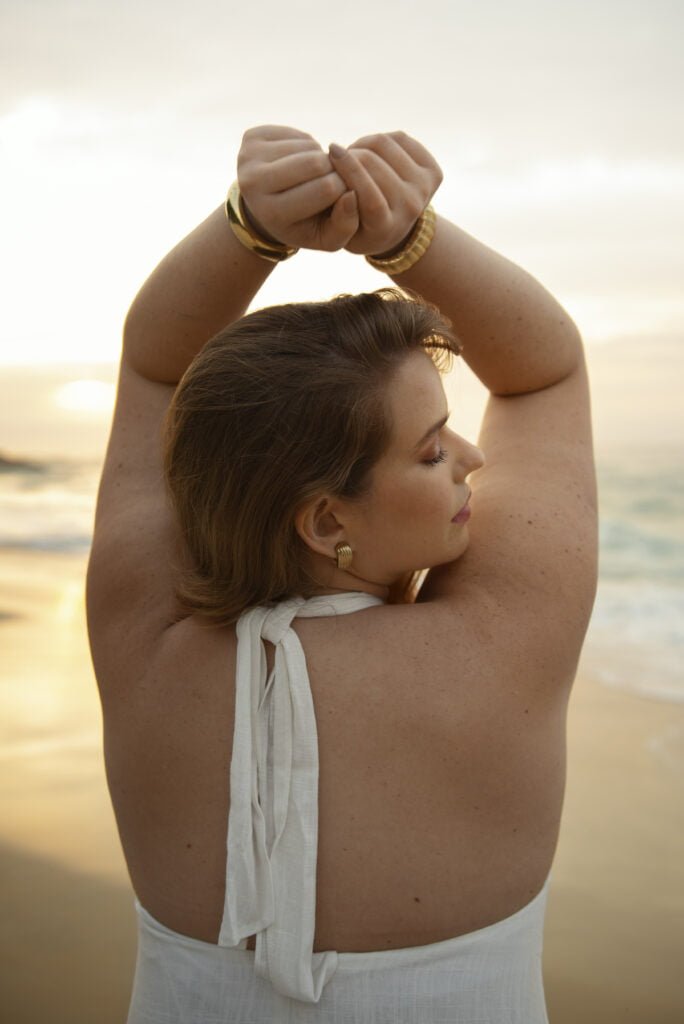The Path to Self-Acceptance
In a world inundated with airbrushed images and unrealistic beauty standards, the journey to self-love and body positivity can seem daunting. Yet, this path is crucial for our mental, emotional, and physical well-being. This comprehensive guide explores the intricacies of body image, the challenges we face, and practical strategies to embrace our unique beauty.
Understanding Body Image – A Complex Relationship
Body image is a multifaceted concept that encompasses how we perceive, think, and feel about our bodies. It’s a relationship that evolves throughout our lives, influenced by various factors:
- Media and Social Influences – The constant barrage of idealized body types in media can skew our perception of “normal” or “beautiful.”
- Personal Experiences – Our interactions with others, particularly during formative years, can significantly impact our body image.
- Cultural Norms – Different cultures have varying ideals of beauty, which can shape our self-perception.
- Family Attitudes – The way body image and food are discussed at home can influence our relationship with our bodies.
- Health and Physical Changes – Illness, ageing, or physical changes can affect how we view ourselves.

Startling Statistics:
- 91% of women are unhappy with their bodies and resort to dieting to achieve their ideal body shape.
- 58% of college-aged girls feel pressured to be a certain weight.
- 94% of teenage girls have been shamed for the way their bodies look.
These statistics underscore the pervasive nature of body image issues and the urgent need for a shift towards body positivity.
The Inner Critic – Understanding and Challenging Negative Self-Talk
Our inner critic often manifests as a harsh, judgmental voice that fuels negative self-perception. Common criticisms include:
“You’re not thin/muscular/tall enough.”
“Your skin isn’t clear/smooth/light enough.”
“You’ll never look as good as [insert name/celebrity].”
Recognizing these thoughts is the first step in challenging them. The inner critic often stems from internalized societal expectations, past criticisms, or comparisons to others. However, it’s essential to remember that this voice isn’t the truth – it’s a learned pattern of thinking that can be unlearned.
Embracing Self-Compassion – A Powerful Antidote
Self-compassion involves treating ourselves with the same kindness and understanding we’d offer a good friend. As psychologist Kristin Neff states, “Self-compassion is simply giving the same kindness to ourselves that we would give to others.”
Practising self-compassion involves three key components:
- Self-kindness – Being gentle and understanding with ourselves rather than harshly critical.
- Common humanity – Recognizing that imperfection is part of the shared human experience.
- Mindfulness – Observing our thoughts and feelings without judgment.
By cultivating self-compassion, we create a nurturing internal environment that fosters self-love and body acceptance.
Practical Steps Towards Body Positivity
- Practice Gratitude for Your Body’s Functions
Instead of focusing solely on appearance, appreciate what your body does for you. Your legs carry you through life, your arms allow you to hug loved ones, and your brain processes complex information. Regularly acknowledging these functions can shift your perspective from criticism to appreciation.
- Surround Yourself with Positive Influences
Curate your social media feeds, friendships, and environments to include diverse body types and positive messages. Follow accounts that promote body positivity and unfollow those that make you feel inadequate.
- Challenge Negative Self-Talk
When you catch yourself in negative self-talk, pause and question it. Is this thought factual or an opinion? Would you say this to a friend? Replace these thoughts with more balanced, compassionate ones.
- Focus on Health, Not Appearance
Shift your focus from how your body looks to how it feels. Engage in activities and foods that make you feel strong, energized, and healthy, rather than exercising and dieting purely for aesthetic reasons.

- Wear Clothes That Make You Feel Comfortable and Confident
Don’t wait to lose weight or change your body to wear clothes you love. Dress your current body in a way that makes you feel good now.
- Practice Body Neutrality
On days when loving your body feels challenging, aim for neutrality. Acknowledge your body without attaching positive or negative emotions to it.
- Engage in Joyful Movement
Find physical activities you genuinely enjoy, rather than exercising as punishment or solely for weight loss. This could be dancing, swimming, hiking, or any activity that brings you joy.
- Practice Mindful Eating
Eat intuitively, paying attention to hunger and fullness cues. Enjoy your food without guilt, and avoid labelling foods as “good” or “bad.”
As body positivity advocate Megan Jayne Crabbe advises,
“Your body is not your masterpiece — your life is.”
This perspective shift can be transformative, allowing us to focus on living fully rather than constantly trying to change our appearance.
The Benefits of Self-Love and Body Positivity
Embracing self-love and body positivity can lead to profound positive changes:
- Improved Mental Health – Body acceptance is linked to lower rates of depression, anxiety, and eating disorders.
- Better Relationships – When we’re comfortable with ourselves, we’re better equipped to form healthy, authentic connections with others.
- Increased Confidence – Accepting our bodies can boost self-esteem in all areas of life.
- Enhanced Overall Well-being – A positive body image is associated with better self-care practices and health behaviours.
- Greater Resilience – Self-love provides a strong foundation to navigate life’s challenges.
- Improved Body Image Flexibility – This allows us to maintain a positive body image even as our bodies change over time.
- Better Sexual Health – Body acceptance is linked to more satisfying intimate relationships.
A study published in the Journal of Health Psychology found that body appreciation was significantly associated with better psychological well-being and health behaviours. This underscores the far-reaching benefits of cultivating a positive body image.
Overcoming Societal Pressures – Redefining Beauty
Society often promotes a narrow definition of beauty, typically favouring certain body types, skin colours, and features. This limited view can make those who don’t fit these ideals feel inadequate or invisible. However, it’s crucial to remember that diversity is natural and beautiful.
As activist Virgie Tovar says,
“The only way to deal with body shame is to understand where it comes from and that it isn’t yours.”
Recognizing that beauty standards are socially constructed and often rooted in historical, cultural, and economic factors can help us critically examine and reject harmful ideals.
Steps to Overcome Societal Pressures:
- Educate Yourself – Learn about the history of beauty standards and how they’ve changed over time.
- Diversify Your Media Consumption – Seek out representations of diverse bodies in media, art, and literature.
- Challenge Beauty Myths – Question messages that suggest there’s only one way to be beautiful.
- Celebrate Diversity – Appreciate the variety of human bodies and features as a natural, beautiful aspect of our species.
- Be a Critical Consumer – Be aware of how products are marketed and resist messages that prey on insecurities.
- Speak Up – Challenge body-shaming comments and promote inclusive language.

Mindfulness and Body Acceptance – A Powerful Combination
Mindfulness – the practice of being present and fully engaged with whatever we’re doing at the moment – can be a powerful tool in fostering body acceptance. By bringing awareness to our bodies without judgment, we can cultivate a more compassionate relationship with ourselves.
Mindfulness Practices for Body Acceptance:
- Body Scan Meditation – This practice involves mentally scanning your body from head to toe, noticing sensations without trying to change them.
- Mindful Eating – Pay full attention to the experience of eating, including tastes, textures, and sensations of fullness.
- Self-Compassion Exercises – Practice treating yourself with kindness, especially when facing challenges or perceived flaws.
- Mindful Movement – Engage in physical activities with full awareness, focusing on how your body feels rather than how it looks.
- Gratitude Practice – Regularly acknowledge and appreciate what your body does for you.
- Loving-Kindness Meditation – Direct feelings of love and compassion towards yourself and your body.
These practices can help you connect with your body more deeply, fostering appreciation and acceptance. As mindfulness expert Jon Kabat-Zinn says,
“Mindfulness means paying attention in a particular way: on purpose, in the present moment, and non-judgmentally.”
The Role of Language in Body Positivity
The way we talk about bodies – both our own and others – can significantly impact body image. Shifting our language can be a powerful step towards fostering a more positive body image culture.
Tips for Body-Positive Language:
- Avoid Commenting on Others’ Bodies – Even well-intentioned comments about weight or appearance can be harmful.
- Use Neutral Descriptors – When necessary to describe bodies, use neutral terms rather than value-laden ones.
- Celebrate Function Over Form – Praise what bodies can do rather than how they look.
- Challenge Diet Talk – Avoid discussions about dieting or weight loss as casual conversation topics.
- Use Inclusive Language – Ensure your language doesn’t exclude or marginalize certain body types.
- Practice Self-Affirmations – Regularly voice positive affirmations about your body and self.
Navigating Body Image in the Digital Age
The rise of social media has brought new challenges to body image. While it can be a platform for body positivity movements, it can also exacerbate insecurities through unrealistic images and constant comparison.
Strategies for Healthy Social Media Use:
- Curate Your Feed – Follow accounts that make you feel good about yourself and unfollow those that trigger negative feelings.
- Be Critical of Images – Remember that many images are edited, filtered, or taken in ideal conditions.
- Limit Screen Time – Set boundaries on your social media use to avoid excessive exposure to potentially triggering content.
- Engage Mindfully – When you do use social media, do so with the awareness of how it makes you feel.
- Create and Share Authentic Content – Be part of the change by sharing realistic, unfiltered content.
- Use Social Media for Connection – Focus on meaningful interactions rather than appearance-based content.
The Intersection of Body Image and Identity
It’s important to recognize that body image issues can be particularly complex for marginalized groups. Factors like race, gender identity, sexuality, disability, and age can all intersect with body image in unique ways.
For example:
- People of colour may struggle with beauty standards that prioritize Eurocentric features.
- Transgender individuals may experience body dysphoria related to their gender identity.
- Disabled individuals may face ableist beauty standards that exclude their bodies.
- Older adults may struggle with discriminatory beauty ideals that value youth.
Addressing body positivity must include an understanding of these intersecting factors and a commitment to inclusivity.
The Journey to Self-Love – A Lifelong Process
Embracing your unique beauty is not a destination but a journey. It’s normal to have fluctuations in how you feel about your body. The goal is not to love your body perfectly all the time but to cultivate a generally positive and respectful relationship with it.

Remember:
- Progress isn’t linear. You may have good days and challenging days.
- Self-love is a practice. Like any skill, it improves with consistent effort.
- Your worth is not determined by your appearance. You are valuable simply because you exist.
- Your body will change throughout your life. Learning to appreciate it at every stage is key.
As you continue on this journey, be patient and kind to yourself. Celebrate small victories and learn from setbacks. Each step towards self-love and body positivity is meaningful and impactful.
Embracing Your Unique Beauty
Your unique beauty lies not just in your physical appearance, but in your experiences, personality, and the way you impact the world. By embracing this holistic view of beauty, we can begin to appreciate ourselves more fully.
As you journey towards self-love and body positivity, remember that you’re not alone. Millions of people around the world are working to cultivate a healthier relationship with their bodies. Your efforts not only improve your own life but also contribute to creating a more body-positive culture for everyone.
In the words of body positivity advocate Jes Baker,
“Body love is a no-diet, no-shame path to a life of freedom.”
By embracing your unique beauty, you open the door to a more joyful, authentic, and fulfilling life.
Take Action – Personalized Support for Your Body Positivity Journey
If you’re ready to take the next step in your journey towards self-love and body positivity, consider booking a one-on-one session with me. As a spiritual and mindfulness coach, I can provide personalized guidance and support tailored to your unique experiences and challenges.
In our sessions, we’ll work together to:
- Identify and challenge negative thought patterns
- Develop personalized mindfulness practices
- Create actionable strategies for cultivating self-love
- Address any specific body image concerns you may have
- Explore the connection between your body image and overall well-being
Don’t wait to start embracing your unique beauty. Book a session today and begin your transformation towards a more positive, accepting relationship with your body.
Schedule your personalized body positivity coaching session. Together, we can nurture a deeper appreciation for your unique beauty and foster lasting self-love.




